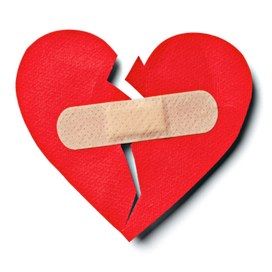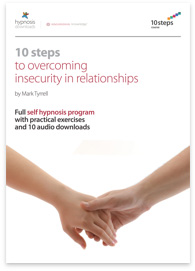How to Heal a Broken Heart
7 soothing ways to mend your emotions when a relationship ends

"Well, since my baby left me,
I found a new place to dwell.
It's down at the end of Lonely Street
At Heartbreak Hotel.
You make me so lonely, baby.
I get so lonely,
I get so lonely I could die."
~ Elvis Presley, "Heartbreak Hotel"
Love matters. And when we're in love, it can seem to be all that matters; a ray of reality in a counterfeit existence. Love lights up life and when it ends, it can feel like the light, the meaning, has all but drained from existence.
Love gone wrong hurts.
The heartache of break up is as old as the hills and has been the focus of plays, poems, and music for thousands of years. But chances are, you're reading this because you are (or have been) heartbroken, and you know that when you're the one left heartbroken, it can feel as if it's only you that could ever feel this bad. Others just don't seem to understand.
The pain of a broken heart is real, though.
Heartbreak and heartache
If you feel heartbroken right now, you will be hurting. 'Hurt' is a word often used when describing the 'pain' of relationship breakup, but it turns out this isn't just metaphor. Studies have found that the same areas of the brain that activate when we experience actual physical pain are also triggered during a painful break up (1). Like any pain, this takes time to heal.
The world and his dog might give you advice like "There's plenty more fish in the sea". But such platitudes, though technically true, don't feel true at the time.
Love makes us feel like the person we love is the only one for us. So do we each really have a soul mate? Someone who was uniquely 'meant for' us?
Do you really have a soul mate?
Well, it can seem like it. We often use this term to describe someone with whom we feel a particular emotional, sexual, and intellectual affinity; someone with whom everything just 'clicks'. When we're with them, we are 'as one'.
We describe great relationships as 'a match made in heaven'. People describe having waited their whole life for this person, the one true love of their life.
This isn't just a New Age idea. Back in the day (2,500 years ago), Greek philosopher Plato wrote about soul mates as originally being one entity, but split in two as they entered the world and having to find one another to ensure personal fulfilment (2).
If there is just one special person and we lose them, then how can we come back from that?
The real and the false
I'm not an authority on the deepest workings of destiny and the universe, but I suspect that even if each one of us does have a soul mate, we could feel as if we've found our soul mate even when we haven't really.
The fact that there may be real gold doesn't mean that 'fool's gold' isn't a very convincing stand in for the real thing. And, of course, if we are capable of connecting in this way, then we should be able to connect on this level to more than one person.
Perhaps the test of your real soul mate relationship would be that it wouldn't end badly.
Whatever your beliefs, feeling broken-hearted can, for a time, feel unbearable. But, as with any of life's difficulties, having a strategy to help you bear this time and come out stronger makes the difference between extended emotional agony and a swifter-than-you-could-have-believed recovery.
Here are some ideas to help heal your broken heart:
1) Give yourself time
When we're in love, we are pumped full of 'feel good chemicals' such as the 'bonding hormone' oxytocin (3) and dopamine, which is also associated with addiction. Serotonin levels in the brain will be higher, making you feel light, energized, and upbeat.
If your lover was making you miserable most of the time, then whatever it was, it wasn't love. Masochistic dependency often stands in for love until the real thing comes along.
Anyway, once the object of your love goes, so do those elevated levels of feel good hormones. Plummeting levels of dopamine make you feel bad. So, although you can feel better quicker than you might suspect, don't assume you 'should' feel perfectly back to normal immediately.
But the biggest mistake is to assume you'll never feel better. This is illusion. However it feels now, you'll learn as time goes by to find life meaningful again without this person.
2) Keep up activities that fully engage your attention
Heartbreak makes us continually dwell on and fanaticize about what could have been, replaying over and over what 'went wrong' and basically putting the imagination into overdrive.
If we start living more in our daydreams (remember that even worrying is a form of daydream), we feel worse. Sure, some of this will be natural as you adjust. But a recent study found that we are at our happiest when engaged in activities that take up lots of our attention. Concentration, rather than daydreaming, makes us happiest day to day (4, 5). Whether it's doing intricate practical work or focussing hard on sports, focus outwards as much as possible.
3) Keep all your friendships and activities going
When we fall in love, it's tempting to 'put all our eggs in one basket' and neglect our wider life as we focus all our attentions onto the object of our adulation. If you've done that, even a little, now is the time to put that right, to get back to your wider life, to see people again, and to engage in your neglected activities and interests. This applies even if you don't feel like it, because the 'feeling like it' often comes after you actually start doing it. No one said that a bit of willpower wasn't needed to help mend a broken heart.
Give yourself a bit of time, but then consciously attend to your life so that you:
- Socialize with friends and family.
- Get out and do things you enjoy.
- Exercise - which is a massive mood booster!
- Pursue interests.
It's also too easy to neglect health during this time. Ensure you eat healthily and prioritize sleep, too.
4) Diminish the power of old associations
You know what it's like: certain songs; certain places; heck, certain times of day can, at first, remind you of your love. In fact, everything seems to link to them. This is a normal part of any grieving process. And whilst this is happening, life can feel painful. But don't assume there is nothing you can do about it.
It's important you still go to some of the same places, still listen to some of the same music, until you build up new associations with these things that don't have to do exclusively with your ex. Consciously doing this will not only help you get over heartbreak, but also give you renewed confidence and a feeling of personal power.
So for a little while, try to avoid associations with your ex that may feel painful. But when you feel over the initial shock, purposely seek out some of these associations so that you can build memories around these situations that are not exclusively connected with your ex. In this way, there will start to be fewer 'reminders'.
5) Question whether this person was really for you
I know you'll have well-meaning friends no doubt telling you this person wasn't really for you, and whether you believe or disbelieve this might not make much difference to the way you actually feel. The brutal fact is, we can miss things that were actually bad for us.
People can miss smoking, taking heroin, or eating health-destroying foods. You can get hooked on what is bad for you if it seems exciting. So missing someone isn't a reliable indication that they were actually good for us.
Being with the wrong person will emotionally destabilize us - make us feel insecure or condition us to have low expectations for ourselves and therefore worsen our self-esteem. But the genuinely right person will help us grow and progress in our lives; the best partnerships occur when each person, through mutual encouragement, helps the other feel new possibilities and a greater sense of possibility in life. The right pairing will survive and not have the seeds of its own destruction in its beginning.
Think it over: were they really right for you above and beyond how they made you feel? Who you thought was the 'love of your life' might have been just a detour on the path to real lasting love with someone else.
6) Remember the bad times and consider what you have learnt
One woman I knew would dig out really unflattering pictures of her ex-boyfriend whenever she felt upset about the way it had ended. Of course, your ex may have been incredibly photogenic, but I want you to avoid the 'biased reminiscence' trap. When something ends, it's easy to recall just the good times, the passion, romance, fun, and excitement. But the relationship ended. And because it ended, there must have been not-so-good times. Focus on those times.
It's easy to wonder, "How could I have been so stupid?!" But love, or the infatuation part, makes us see our relationship the way we want to see it. Often, the warning signs that make it obvious to others that all is not wonderful go unnoticed by us until much later.
So again, focus on the not-so-good times from this relationship, learn from them, and avoid exclusively blaming yourself or your former partner. It takes two to tango, as they say.
7) Avoid cynicism and love again
Most people - or, at least, many people - feel heartbroken at some time.
It's then all too easy to fall prey to cynicism, to feel that 'all men are commitment phobic' or 'cheating bastards' or that all women are 'faithless jezebels'. Assuming a general rule from a specific experience is a huge, but common, thinking error that leads to all kinds of unhappiness.
Not all people are the same in all ways. You can and will love again. Just because the last love may have felt like the best you've ever had, it doesn't mean the best is not yet to come.
You have been in a great deal of pain and perhaps real shock. But you will get through this; it will feel better. Just as a hill can feel huge when we're up close to it, but when we look back from not too great a distance, it just looks like a natural - even flat - part of the countryside.
If you do have a soul mate, there won't be major misunderstandings or broken connections or excitement over stability, but rather a deep sense of shared understanding, as well as passion.
10 Steps to Overcome Insecurity in Relationships course
Despite how much you love your partner, are you worried you're driving them away?...
References
- Experiments show that the upset of your loved one finishing with you activates brain regions (such as the insular cortex ) more usually associated with processing physical pain. See: Kross, E., Berman, M.G., Mischel, W., Smith, E.E., Wager, T.D. Social rejection shares somatosensory representations with physical pain. Proceedings of the National Academy of Sciences, 2011. DOI: 10.1073/pnas.1102693108
- See Plato's The Symposium dated c. 385–380 BCE. It addresses the origins, purpose, and nature of love.
- Associated with pair bonding and even group bonding and orgasm.
- Daydreaming or mind wandering, even though it can lead to creative solutions, for the most part doesn't lead to feeling good, according to a large study conducted at Harvard University. See: Killingsworth, M.A. and Gilbert, D.T. A Wandering Mind Is an Unhappy Mind. Science. 12 November 2010: Vol. 330, no. 6006, p. 932. DOI: 10.1126/science.1192439
- Interestingly, it's been found that the brain uses up much more energy when it's not focussed externally, but rather 'standing idle' or daydreaming. In this way, constant introspection and fantasizing at the expense of external focus can truly be exhausting. See: Buckner, R.L., Andrews-Hanna, J.R., and Schacter, D.L. (2008) The brain's default network. Annals of the New York Academy of Sciences. 1124:1-38.






